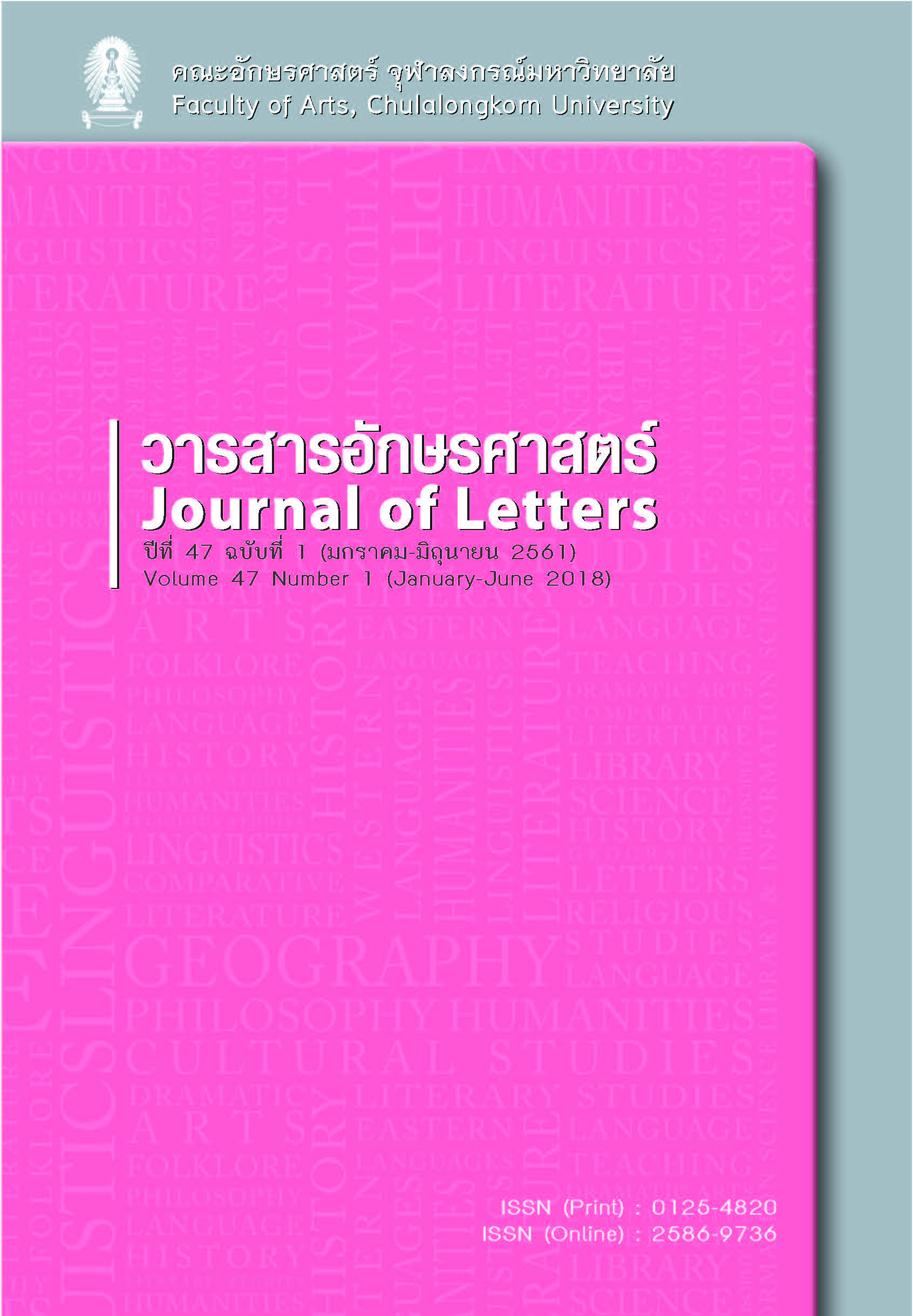Bāṇa: The Poet with Egotism
Keywords:
Bāṇa, poetic egotism, Sanskrit literatureAbstract
Poetic egotism, defined as confidence of poets’ self or works, probably appears in Sanskrit literature since Itihāsa period. The concept has previously been focused on works themselves and later on that relating to poet’s self since Subandhu, a Sanskrit poet in 6th century. Amongst Sanskrit poets, Bāṇa shows his own egotism remarkably. It is, therefore, the objective to study characteristic of Bāṇa’s poetic egotism represented in his works and the reasons behind the egotism. The findings are Bāṇa is very famous amongst poets in later period. It is noticeable that poets contemporary with him do not give him any compliments, whereas Bāṇa shows egotism outstandingly, as can be seen in eulogies of his own family and himself, hiding himself through Śleṣa, a kind of Sanskrit punning, insincere condescension, and violent criticism to others. Bāṇa’s remarkable egotism reflects that he wanted to find exploitation to himself in Harṣa’s royal court because he might become one of royal poets in almost the end of his reign. Besides, poetic egotism is represented to conceal self-diffidence as well, as can be seen from reference to ‘other’ in his egotism at the same time, which Sanskrit poets never do. Hence, Bāṇa’s poetic egotism shows some complicated characteristics and not to be regarded as just confidence in poetic skill without considering behind the scenes.
References
Karuna-Ruangurai Kusalasai. กรุณา-เรืองอุไร กุศลาสัย. 2533.Mahabharatayudh มหาภารตยุทธ [Mahabharatayuddha]. Bangkok: Riligion Committee for Development.
Kusuma Raksamanee. กุสุมา รักษมณี. 2549. Karn wi kroa wannakadi Thai tam trisadee wannakadi Sanskrit การวิเคราะห์วรรณคดีไทยตามทฤษฎีวรรณคดีสันสกฤต. [An Analysis on Thai Literature with Sanskrit Poetics]. Bangkok: Department of Eastern Language, Faculty of Archaeology, Silpakorn University.
Saksri Yamnadda. ศักดิ์ศรี แย้มนัดดา. 2534. Ahangkarn hang kavi อหังการแห่งกวี [Poet’s Egotism]. Warasarn Pasa Lae Wannakadee Thai วารสารภาษาและวรรณคดีไทย [Journal of Thai Language and Literature]. 8,1: 1-10.
ภาษาอังกฤษ
Cowell, F. B. & Thomas, F.W. 1968. The Harṣa-Carita of Bāṇa. Delhi: Motilal Banarsidass.
Kale, M. R. 1968. Kadambarī by Bāṇa. Delhi: Motilal Banarsidass.
Lienhard, Siegfried. 1984. A History of Classical Poetry: Sanskrit-Pāli-Prakrit. Wiesbaden: Otto Harrassowitz.
Lochtefeld, James G. 2002. The Illustrated Encyclopedia of Hinduism. New York: The Rosen Publishing Group, Inc.
Macdonell, A. A. 1997. A History of Sanskrit Literature. Delhi: Motilal Banarsidass.
Monier-Williams, Sir Monier. 2008. A Sanskrit English Dictionary. Delhi: Motilal Banarsidass.
Quackenbos, George Payn. 1917. The Sanskrit Poems of Mayūra. New York: Columbia University Press.
Ridding, C. M. 1896. The Kādambari of Bāṇa. London: The Royal Asiatic Society.
Smith, David. 2009. Princess Kādambarī (vol.1). New York: New York University Press.
Tubb, Gary. 2014. On the Boldness of Bāṇa. In Innovation and Turning Points Toward A History of Kāvya Literature, Bronner, Y.; Shulman, D.; Tubb, G., eds., 308-354. New Delhi: Oxford University Press.
Werner, Karel. 2005. A Popular Dictionary of Hinduism. Richmond: Curzon Press.
Downloads
Published
How to Cite
Issue
Section
License
Copyright and plagiarism
Authors are responsible for obtaining permission to use copyrighted materials from copyright owners. Authors are responsible for observing requisite copyright law when quoting or reproducing copyrighted materials. Quotations and reproductions of content from other published sources must be accompanied by a reference and all sources should be clearly listed in the references section. Quotations and reproductions of content from external sources without due attribution could be considered a severe infringement of academic conduct and may constitute a legal offence under the Copyright Act of B.E. 2537. Any legal ramifications arising from the infringement of copyright regulations would be the sole responsibility of the author(s).



